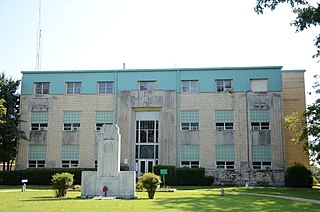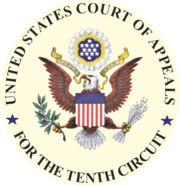
The American Civil Liberties Union (ACLU) is a nonprofit organization founded in 1920 "to defend and preserve the individual rights and liberties guaranteed to every person in this country by the Constitution and laws of the United States". The ACLU works through litigation and lobbying, and has over 1,800,000 members as of July 2018, with an annual budget of over $300 million. Affiliates of the ACLU are active in all 50 states, the District of Columbia, and Puerto Rico. The ACLU provides legal assistance in cases where it considers civil liberties to be at risk. Legal support from the ACLU can take the form of direct legal representation or preparation of amicus curiae briefs expressing legal arguments when another law firm is already providing representation.

Haskell County is a county located in the southeast quadrant of the U.S. state of Oklahoma. As of the 2010 census, the population was 12,769. Its county seat is Stigler. The county is named in honor of Charles N. Haskell, the first governor of Oklahoma.

Stigler is a city in and county seat of Haskell County, Oklahoma. The population was 2,685 at the time of the 2010 census, down from 2,731 recorded in 2000.
Dennis v. United States, 341 U.S. 494 (1951), was a United States Supreme Court case relating to Eugene Dennis, General Secretary of the Communist Party USA. The Court ruled that Dennis did not have the right under the First Amendment to the United States Constitution to exercise free speech, publication and assembly, if the exercise involved the creation of a plot to overthrow the government. In 1969, Dennis was de facto overruled by Brandenburg v. Ohio.

The Freedom From Religion Foundation (FFRF) is an American nonprofit organization, which advocates for atheists, agnostics, and nontheists. Formed in 1976, FFRF promotes the separation of church and state, and challenges the legitimacy of many federal and state programs that are faith-based. It supports groups such as nonreligious students and clergy who want to leave their faith.
In United States law, the Establishment Clause of the First Amendment to the United States Constitution, together with that Amendment's Free Exercise Clause, form the constitutional right of freedom of religion. The relevant constitutional text is:
Congress shall make no law respecting an establishment of religion...
Liberty Counsel is a 501(c)(3) tax-exempt religious liberty organization that engages in litigation related to evangelical Christian values. Liberty Counsel was founded in 1989 by its chairman Mathew Staver and its president Anita L. Staver, who are attorneys and married to each other. The Southern Poverty Law Center has listed Liberty Counsel as an anti-LGBT hate group, a designation the group has disputed. The group is a Christian ministry.
McCreary County v. American Civil Liberties Union of Kentucky, 545 U.S. 844 (2005), was a case argued before the Supreme Court of the United States on March 2, 2005. At issue was whether the Court should continue to inquire into the purpose behind a religious display and whether evaluation of the government's claim of secular purpose for the religious displays may take evolution into account under an Establishment Clause of the First Amendment analysis.
Van Orden v. Perry, 545 U.S. 677 (2005), was a United States Supreme Court case involving whether a display of the Ten Commandments on a monument given to the government at the Texas State Capitol in Austin violated the Establishment Clause of the First Amendment.

Glassroth v. Moore, 335 F.3d 1282, and its companion case Maddox and Howard v. Moore, 229 F. Supp. 2d 1290, is a decision from the United States Court of Appeals for the Eleventh Circuit that held a 21⁄2 ton granite monument of the Ten Commandments placed in the rotunda of the Heflin-Torbert Judicial Building in Montgomery, Alabama by then-Alabama Supreme Court Chief Justice Roy Moore was a violation of the Establishment Clause of the First Amendment.

The Thomas More Law Center is a Christian, conservative, nonprofit, public interest law firm based in Ann Arbor, Michigan, and active throughout the United States. According to its website, its goals are to "preserve America's Judeo-Christian heritage, defend the religious freedom of Christians, restore time-honored moral and family values, protect the sanctity of human life, and promote a strong national defense and a free and sovereign United States of America."
In Stone v. Graham, 449 U.S. 39 (1980), the Supreme Court of the United States ruled that a Kentucky statute was unconstitutional and in violation of the Establishment Clause of the First Amendment, because it lacked a nonreligious, legislative purpose. The statute required the posting of a copy of the Ten Commandments on the wall of each public classroom in the state. The copies of the Ten Commandments were purchased with private funding, but the Court ruled that because they were being placed in public classrooms they were in violation of the First Amendment.
Pleasant Grove City v. Summum, 555 U.S. 460 (2009), is a decision from the Supreme Court of the United States which ruled on the U.S. Constitution's prohibition on a government establishment of religion specifically with respect to monuments on public land.
Capitol Square Review & Advisory Board v. Pinette, 515 U.S. 753 (1995), is a United States Supreme Court case that focused on First Amendment rights and the Establishment Clause. Vincent Pinette, an active member of the Ku Klux Klan in Columbus, Ohio, wanted to place an unattended cross on the lawn of the Capitol Square during the 1993 Christmas season. Pinette and his fellow members of the KKK submitted their request. The advisory board originally denied this request. However, Pinette and the other members of the Ohio Chapter of the Klan fought this decision in the United States District Court for the Southern District of Ohio. The court found in favor of the Klan and the Advisory Board issued the permit. The Board appealed to the United States Court of Appeals, which affirmed the decision of the district court. The board made one last petition to the Supreme Court where the decision was made, by a vote of seven to two, that the Klan was permitted to display the cross at the public forum.
Florence v. Board of Chosen Freeholders, 566 U.S. 318 (2012), was a United States Supreme Court case in which the Court held that officials may strip-search individuals who have been arrested for any crime before admitting the individuals to jail, even if there is no reason to suspect that the individual is carrying contraband.

American Civil Liberties Union v. Clapper, 785 F.3d 787, was a lawsuit by the American Civil Liberties Union (ACLU) and its affiliate, the New York Civil Liberties Union, against the United States federal government as represented by then-Director of National Intelligence James Clapper. The ACLU challenged the legality and constitutionality of the National Security Agency's (NSA) bulk phone metadata collection program.

Prescott v. Oklahoma Capitol Preservation Commission, 2015 OK 54, 373 P.3d 1032, was a landmark case by the Oklahoma Supreme Court in which the Court found the placement of a Ten Commandments Monument at the Oklahoma State Capitol was unconstitutional.
Oklahoma Ballot State Question 790 was a ballot question in Oklahoma during the 2016 Elections that would have removed the Blaine Amendment from the Oklahoma State Constitution. Question 790 was defeated.

The Ten Commandments Monument is an outdoor monument installed on the Arkansas State Capitol grounds in Little Rock, Arkansas, in the United States. The monument is being challenged as unconstitutional by the American Civil Liberties Union (ACLU). The ACLU says that the monument demonstrates a religious preference, violating the First Amendment and the religious preference prohibition clause of the Arkansas State Constitution.

The Haskell County Courthouse, at 202 E. Main St. in Stigler, Oklahoma, was built in 1931. It was listed on the National Register of Historic Places in 1984.








